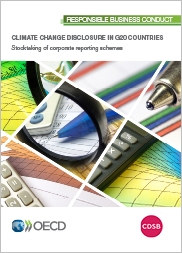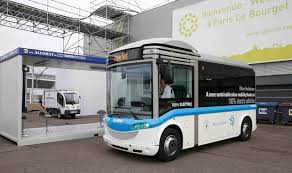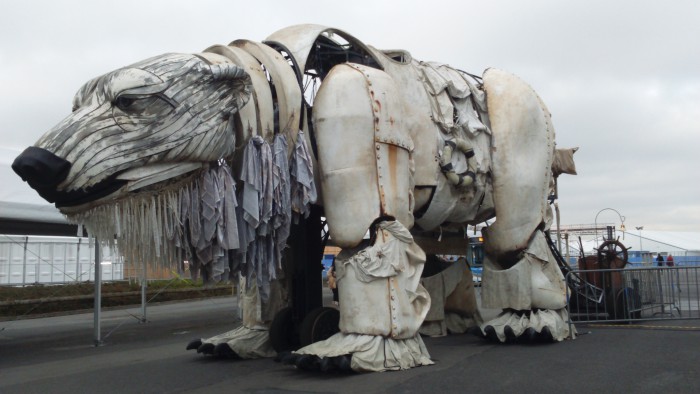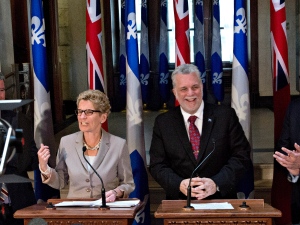23rd December 2015 Paris, France
COP21: three trends towards fundamental change

With considerable justification, COP21 has been widely hailed as a success. It reached a legally-binding agreement that aims to keep global warming well below 2 degrees, with a review-mechanism towards ever more ambitious targets, and financial commitments to support developing countries on their path towards environmental sustainability. This agreement is far better than most could have hoped for, however the reasons COP21 was a real success run deeper. Three things stood out for me beyond the agreement: the key role taken on by business, the change in the global governance architecture, and the underlying trends that show real change is possible.
Business is a crucial catalyst of change
The role of business in the shift towards environmental sustainability is manifold. This is the result of a big shift in approach which has taken considerable effort: it is now recognised that “green” and “economy” go together.

Businesses provide the investment and innovation that allow us to do more with less
At the “Solutions COP21” event at the Grand Palais, businesses showcased their most innovative products, from hydro-electric cars to energy-efficient recycling machines, “green” factories and buildings, and new processes to avoid food waste (including growing edible mushrooms out of used coffee).
Thanks to their crucial investment and innovation, businesses can create new products that are energy-efficient, improve recycling, and come up with new solutions. They help us do more with less to save valuable resources. Many businesses are also changing their own behaviour to pollute less and have more energy-efficient systems.
When government action is seen as insufficient, some companies are stepping up their efforts
Increasingly, businesses are not waiting for governments to act in the fight against global warming and are taking action themselves. At an OECD event on corporate disclosure, the fact that companies are currently not obliged to disclose their emissions was identified as a key issue resulting in less efficient markets. For example, investors are currently not able to integrate the financial risk of climate change in their assets. Several companies have begun to disclose their emissions voluntarily, and there is hope that this will put pressure on other companies to follow suit.
 Similarly, at an event on the role of business at COP, several large companies like the insurer AXA and the French construction company Saint Gobain called for more regulation to address market failures and for a functioning carbon pricing system, as this would improve the effectiveness of markets.
Similarly, at an event on the role of business at COP, several large companies like the insurer AXA and the French construction company Saint Gobain called for more regulation to address market failures and for a functioning carbon pricing system, as this would improve the effectiveness of markets.
It seems that the businesses present at COP have understood what is at stake. On the one hand, they need to integrate the risks linked to global warming and do their best to address them, in order to protect their business model. On the other hand, the necessary shift towards a more environmentally-friendly economy opens significant opportunities. Companies can benefit from innovative “greener” products and save resources in their own production methods or working behaviours. They have also recognised that in the long term, stronger regulation will make companies more innovative and productive.
The move towards multi-stakeholder global governance
However important the role of business, companies alone cannot take on the immense task of making our economy more sustainable. Action against climate change will only have a deep and lasting impact if all stakeholders (political, economic, and societal; international, national and sub-national) are aligned. The COP conference, with the side-events and pavilions around it, proved that this alignment has already started to happen. In these events, businesses big and small, universities, NGOs and associations, city councils, governments, were all present in the same room and with the common objective of moving towards an environmentally sustainable economy.
Cities and regions are a strong driving force pushing for climate action
At COP21, the role of cities and regions in particular stood out. Cities currently account for approximately 70% of global emissions and are increasingly active in policies addressing climate change. A major event at COP21 brought together leading regional governors including the Governor of California Edmund G. Brown Jr. and the Mayor of Paris, Anne Hidalgo. They outlined their actions towards a green economy and made substantial commitments. According to the Mayor of Seoul, Said Park Wok, “local governments are actually leading national governments”.

At a WWF event about “re-inventing cities”, Carlo Ratti, a researcher at the Massachusetts Institute of Technology (MIT), presented a model combining better city management, urban policies and the rise of the sharing economy. He found that a big city like New York could function effectively with only 20% of the cars it has today.
National governments are still a central player
The governments of 195 countries participated in the COP21 negotiations. According to Eric Beinhocker, the Executive Director of the Institute of New Economic Thinking who spoke at the OECD Green Growth Forum, COP21 illustrated two crucial shifts in governments’ attitudes to global warming. First, that governments no longer see environmental policy as a zero-sum game, but a positive-sum game where all countries are making an effort.
This was illustrated by the wide-ranging commitments made by governments at COP which grew every day, in areas such as investment in renewable energies, support to developing countries, and ambitious emission reduction targets. This encouraged other governments to increase their own commitments. Secondly, there has been a shift from “whether” to “how” to fight climate change. All governments now recognise that global warming is an issue they must address and 187 countries have submitted Intended Nationally Determined Contributions (INDCs) outlining the steps they will take to address climate change.

Beyond formal targets, governments also have a key role to play in changing the incentive structure and encouraging other actors to change their behaviour. Both businesses and civil society are calling on governments to use their unique role to do more in environmental policy. Governments can begin by ending subsidies to fossil fuels (estimated at US$548 billion in 2013 by the International Energy Agency). They can create an effective carbon pricing system, strengthen environmental regulation, ensure the investment framework is predictable and stable to foster innovation, and create the incentives for companies to disclose their emissions. For example in January 2016, a new law by the French Government will come into force making it compulsory for institutional investors to publicise how they integrate climate change risk in their activities and disclose their carbon footprint.
There is more change than meets the eye – but will it be enough?
There are three underlying trends which have the potential to fundamentally change our mentality and behaviour, and drive change towards an environmentally-sustainable world.
Individuals: consumers and citizens
It is an obvious argument but an essential one: if every individual changed their behaviour, the shift towards a green, zero net-emission economy would be easier and faster. At a COP21 EU event on the contribution of international trade to climate action, a representative of the German company Siemens argued that consumers worldwide held the power to change: even if only 10% of consumers changed their behaviour, that would shake up the whole business and force companies to adapt.
Beyond consumers, individuals are more importantly citizens with the power to shape local, regional, national and consequently international politics. Though COP21 sometimes felt like an event where we preached to the converted, there was undoubtedly a huge push from civil society and the hundreds of NGOs that were present and lobbied hard during the negotiations. An increasing part of society is concerned by climate change and is (hopefully) ready to act.

People have the power to bring about change. Individual action is important, but it needs to be accompanied by strong government and business commitments. The responsibility of climate action should not all fall on their shoulders.
Clubs of the willing
In nearly all events I attended at COP21, there was a reference to the “clubs of the willing”: stakeholders (companies, cities, regions, countries, etc.) that champion environmental action and decide to change without necessarily waiting for their peers to act.

The Minister for the Environment of Ontario, Canada, illustrated this. Ontario has formed a coalition with two other regions (Quebec and California) and they now have common environmental policies, including a cap-and-trade system for carbon. As they are three economically weighty regions, they have the capacity to change the economic and environmental dynamics of the whole North-American continent.
Another example is in international trade. The Environmental Goods Agreement is currently being negotiated by a group of 17 members (including the EU as one), with the aim of lowering barriers to trade in over 1000 environmental goods (i.e. the components of renewable energy production). If and when it succeeds, it will lower the cost of these products, allowing them to be more widely traded and used.
The power of these “clubs of the willing” is that if they are successful, their peers will feel the pressure to raise their own standards in order not be left behind, expanding the commitment and leading to deeper change.
Game-changers
The global financial crisis showed that a relatively small event (the collapse of the subprime mortgage market in the US) can have deep, wide-ranging and global consequences that were unexpected until the very day of the event. This illustrates that fundamental change need not be gradual or thoroughly thought-through. Similarly, one or several game-changing events could tilt the balance and lead to an environmentally-friendly global economy. They could stem from any area: business (a game-changing innovative product or sector), government (a very successful policy that other governments then adopt), a crisis (a huge environmental disaster that changes people’s mindsets). We cannot know in advance, but in our globalised world change can be fast, unexpected and radical.
Is this enough?
Though there is reason to be optimistic that these drivers will lead to real change, the task of moving to a zero net emissions world is complex and by no means a given. Actions taken at the micro level by consumers, companies and governments can have a positive impact, but a systemic change is also needed for a real shift towards a green economy. Today’s incentive structures are such that short-term thinking is rewarded over long-term thinking (i.e. financial investments’ horizons, management boards of companies, or politicians facing elections) and there is no incentive for greater coherence, as the (sometimes competing) huge number of initiatives and associations at COP21 illustrated.
In July 2015, the OECD published a report on the need to align policies in all areas of the economy for a shift to a low-carbon economy, from innovation and skills to tax structures and trade. Be it fast or gradual, unexpected or agreed, a fundamental and all-encompassing shift is necessary. COP21 is just the beginning.
We should all think about what we can do to reduce our own carbon footprint (see here for tips), be responsible consumers (and buy less), as well as get involved with our local community, associations and political parties to achieve positive change.
